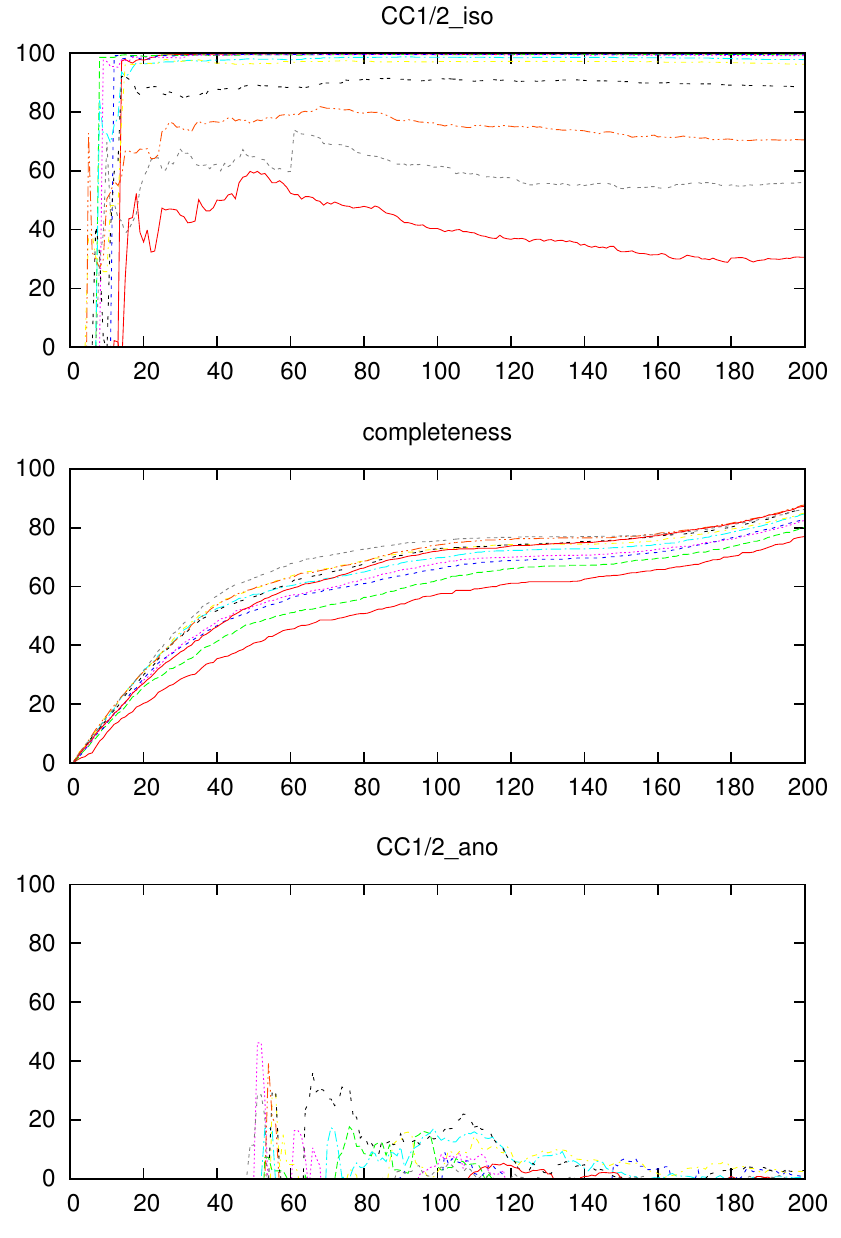Xds maxcc12
To analyze XDS_ASCII.HKL in terms of the detailed course of CC1/2 by frame number and resolution, you could use the program XDS_MAXCC12 .
You also need a script such as
#!/bin/bash xds_maxcc12 XDS_ASCII.HKL > xds_maxcc12.log # xds_maxcc12 has options for resolution range and number of bins grep a$ xds_maxcc12.log > temp.a grep c$ xds_maxcc12.log > temp.c grep d$ xds_maxcc12.log > temp.d paste temp.a temp.c temp.d | sed -e 's/a. //' -e 's/c. //' > temp.dat gnuplot<<eof set term postscript color portrait set out 'xds_maxcc12.ps' set yrange [0:100] set multiplot layout 3,1 set title "CC1/2_iso" # adding labels to the lines make the plot ugly so remove them; # but if you want to know which line is which resolution range then # comment out the next line: set nokey plot 'temp.dat' us 1:2 w li,'temp.dat' us 1:3 w li,'temp.dat' us 1:4 w li,\ 'temp.dat' us 1:5 w li,'temp.dat' us 1:6 w li,'temp.dat' us 1:7 w li,\ 'temp.dat' us 1:8 w li,'temp.dat' us 1:9 w li,'temp.dat' us 1:10 w li,'temp.dat' us 1:11 w li set title "completeness" plot 'temp.dat' us 1:12 w li,'temp.dat' us 1:13 w li,'temp.dat' us 1:14 w li,\ 'temp.dat' us 1:15 w li,'temp.dat' us 1:16 w li,'temp.dat' us 1:17 w li,\ 'temp.dat' us 1:18 w li,'temp.dat' us 1:19 w li,'temp.dat' us 1:20 w li,'temp.dat' us 1:21 w li set title "CC1/2_ano" plot 'temp.dat' us 1:22 w li,'temp.dat' us 1:23 w li,'temp.dat' us 1:24 w li,\ 'temp.dat' us 1:25 w li,'temp.dat' us 1:26 w li,'temp.dat' us 1:27 w li,\ 'temp.dat' us 1:28 w li,'temp.dat' us 1:29 w li,'temp.dat' us 1:30 w li,'temp.dat' us 1:31 w li unset multiplot quit eof rm temp.a temp.c temp.d temp.dat # next line: replace okular with your favourite postscript viewer okular xds_maxcc12.ps # convert to pdf; this compresses and makes it easier to print it ps2pdf xds_maxcc12.ps xds_maxcc12.pdf # you could now use a PDF viewer rm xds_maxcc12.ps
which you save as plot_maxcc12.rc in your ~/bin or (as root) in /usr/local/bin . Now, after processing a dataset with XDS, you can simply use plot_maxcc12.rc and get plots like
